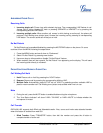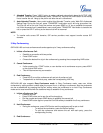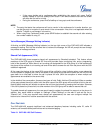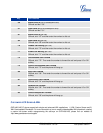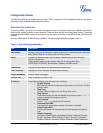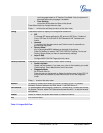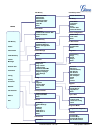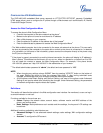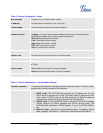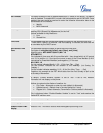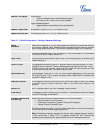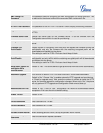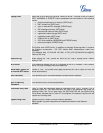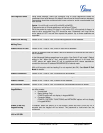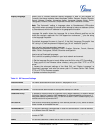
Grandstream Networks, Inc. GXP1400/1405 User Manual Page 20 of 36
Firmware version: 1.0.1.83 Last Updated: 08/2011
Table 13: Device Configuration - Status
MAC Address
The device ID, in HEXADECIMAL format.
IP Address
This field shows IP address of GXP1400/1405.
Product Model
This field contains the product model information.
Part Number
This field contains the product part number.
Software Version
• Program: This is the main firmware release number, which is always used for
identifying the software (or firmware) system of the phone.
• Boot: Booting code version number
• Core: Core code version number
• Base: Base code version number
• DSP: DSP code version number
• Aux: Aux code version number
System Up Time
This field shows system up time since the last reboot.
System Time
This field shows the current time on the phone system.
Registered
Indicates whether accounts are registered to the related SIP server.
PPPoE Link Up
Indicates whether the PPPoE connection is enabled (connected to a modem) and the
NAT type.
Service Status
• GUI: shows the GUI status: running or stopped
• Phone: shows the phone status: running or stopped
Core Dump
Download core dump file for troubleshooting when necessary.
Table 14: Device Configuration – Settings/Basic Settings
End User Password
This contains the password to access the Web Configuration Menu. This field is case
sensitive with a maximum length of 25 characters.
IP Address
The GXP1400/1405 operates in three modes:
1. DHCP mode: The GXP1400/1405
acquires its IP address from the first
DHCP server it discovers on its LAN. The DHCP option is
reserved for NAT
router mode. In DHCP mode, a
ll the field values for the Static IP mode are
not used (even though they are still saved in the Flash memory).
2. PPPoE mode: To use the PPPoE feature, set the PPPoE account settings
(PPPoE account ID, PPPoE password and PPPoE service name).
The
GXP1400/1405 establishes a PPPoE session if any of the PPPoE fields is
set.
3. Static IP mode: Configure all of the following fie
lds: IP address, Subnet
Mask, Gateway, DNS Server 1, DNS Server 2 and Preferred DNS Server.



